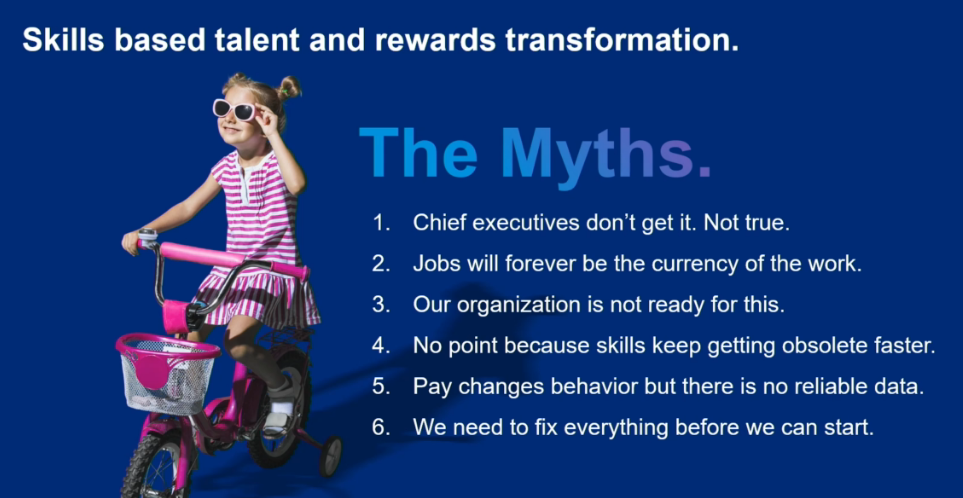Navigating into a skills-based future

The pandemic has been a real bummer for many business practices yet it is also a tremendous opportunity for the HR function to innovate, to adopt some leading practices, and really to drive the agenda for the business in terms of HR change and transformation. At Mercer's 2021 Regional HR Conference, Mercer’s Lewis Garrad (above left), Partner, Career Business Leader, Singapore, and Kabir Nath (above right), Principal, Talent Solutions, Singapore talk about some of the myths that exist in relation to skills-based talent and rewards transformations while discussing the road ahead to skill-based transformation.
Skills-based talent and reward transformation - Debunking the myths

-
Chief executives don't get it. Not true.
If an employee believes that CEO skills are not in front and center of agility & flexibility then its definitely not true. Kabir Nath emphasised that skill-based transformation is the need for the future of work and the chief executives do realise the same. Lewis Garrad added, “ CEOs are taking care of business problems and how that can start resource investment for really taking action on the future of learning and workforce re-skilling.”
-
Jobs will forever be the currency of the work
Policies program, systems reward performance, hiring, etc has been centered around jobs, hence it’s hard to grapple that jobs won’t forever be the currency of the work. Kabir Nath shares that to truly get to a skills-based future, all these have to change. The paradigm is shifting from the work that's fairly strict and process-oriented to the emergence of talent in hybrid roles where the roles are partially fixed and can flow into these jobs.
-
Our organization is not ready for this
How are organisations preparing themselves for this eventuality? According to Lewis Garrad, “one look at traditional evolving, leading & future-focused talent practices and how those change as different skills models emerge, tells us that actually, the way this is going is increasingly where the people will see their jobs as collections of singular roles. “ He added that the organisation can transition to a more skills-based talent practice by not just by managing talent, but also by changing the way employees work. Everyone from employee to employer has to organize so as to be ready for the eventuality.
-
No point because skills keep getting obsolete faster
In the discussion of doing the jobs versus the core skills that help people progress in their career, skills that came were adaptability, collaboration, communication self-management, and more. Yet the set of skills that will really help professionals grow in their career in this skill-based future are influencing decision making, being able to really develop people around you, and rewarding them for the upgrades. It’s important to focus on a holistic approach to learning skills.
-
Pay changes behaviour but there is no reliable data
Mercer’s skill survey put forth an interesting point that skill library is all about that taxonomy data library of skills, where it has a huge volume of skills insights and provides that the clients the skills-based solutions. The pay then allows us to start to link comp data to those different skills, and then skills pay planner is the modeling tool that helps the employer think about if they change the skills for certain employees, how might that impact their compensation. Both Garrad and Nath discuss that in spite of this inference, it’s not easy to presume the change in behaviour post-payment without understanding the skill-based reward system can play an objective role in transforming strategies.
-
We need to fix everything before we can start
Nath and Garrad observed that building a skill-based culture is not a linear journey but a team effort and will require different pieces of puzzles to come together. Hiring for certain premium skills requires the whole organisation to start talking skills right and that starts with building a fairly automated taxonomy that doesn't require people in a shared drive to sit on something. Instead, culture driven by employees getting immersed in their day-to-day jobs and stepping up to drive their role with ownership is where the organisations need to invest in.
Both Garrad and Nath concluded the session by describing a hybrid role as a skills cluster, mixed with capabilities that help would solve novel and interesting problems. Organisations need to adapt to skill-based eventualities and build this kind of hybrid role. The fluid way of working is much more common in technology and it would kick the emergence of team-based performance practices. It’s important that if the team won't always succeed then the chief executives have to be able to recognize the effort and capture the learning. This would a good practice to show how skills-based talent strategies, linked to agility and learning, thrive with team-based performance and other HR practices as well.
People Matters is the exclusive media partner for Mercer's 2021 Regional HR Virtual Conference.
















